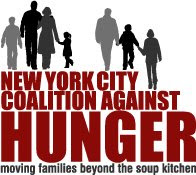
Americans who depend upon emergency food programs need more than a meal or a pantry bag. The increased need for emergency food programs across the nation points to a lapse in governmental oversight of social programs coupled with economic problems that leave many citizens unable to afford the most basic of necessities.
The 350 emergency food programs in Brooklyn, like programs across the nation, have seen an increase in customers who are steadily employed but have been hit hard by the forces of rising healthcare costs, a spiraling economy, and the inadequacy of current food stamp benefits, which should serve as the first line of defense for food insecure households. For Brooklyn residents, the force of gentrification further amplifies the problem: according to a report recently released by Congressman Anthony Weiner, nearly 30 percent of Brooklyn residents pay half or more of their income for shelter.
As NYCCAH reported in last year’s Hunger Survey, 67 percent of Brooklyn pantries suffered from shortages in 2007, following federal and state funding cuts. The crisis in Brooklyn is far from unique, and the solutions need to address the nationwide problem. “We need a federal commitment to living wage jobs so people can earn enough to feed their families and pay rent. We also need universal healthcare so that if you are working full-time you’re not impoverished,” said NYCCAH Executive Director Joel Berg. It is an agenda that defies the romanticizing of the soup kitchens and food pantries that fill a need in the absence of essential government action. “The Right has convinced Americans that the anti-poverty programs of the 1960s and 70s were failures,” said Berg. “The vast majority believe that the War on Poverty didn’t work. In reality, between 1960 and 1973 the poverty rate was cut in half.”
It is this kind of response and the attendant fiscal commitment that will make emergency food programs obsolete. “This agenda is to the right of Teddy Roosevelt,” Berg says. “It’s a mainstream plan to reduce hunger and poverty.”
 The area surrounding the Jacob Riis Neighborhood Settlement House has only one grocery store, despite being home to Queensbridge Houses, the largest public housing development in the nation. In a neighborhood where fresh produce is very hard to find, the new Long Island City Community Supported Agriculture Project is offering residents not only a source for local produce, but also a chance to become directly involved in the fight for greater food access in their community.
The area surrounding the Jacob Riis Neighborhood Settlement House has only one grocery store, despite being home to Queensbridge Houses, the largest public housing development in the nation. In a neighborhood where fresh produce is very hard to find, the new Long Island City Community Supported Agriculture Project is offering residents not only a source for local produce, but also a chance to become directly involved in the fight for greater food access in their community. 


